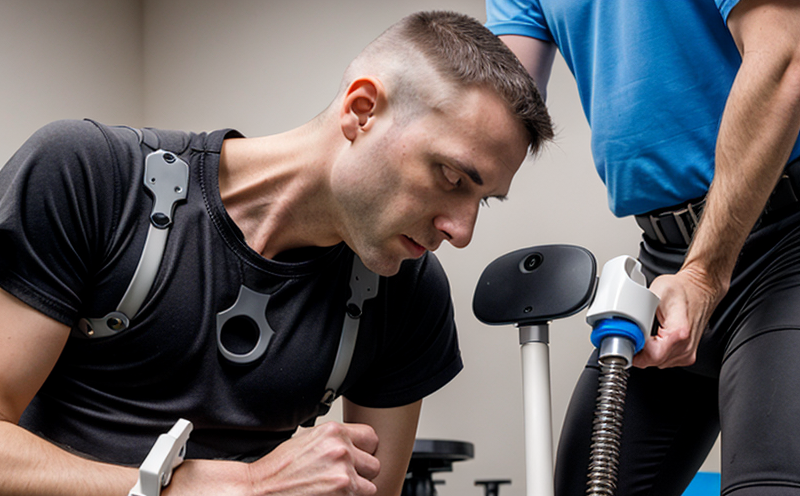EN 45545 Biocompatibility Testing of Prosthetic Materials
The European Standard EN 45545 specifies biocompatibility testing requirements and methods applicable to orthopedic and prosthetic materials. This standard is crucial for ensuring that the materials used in medical devices, such as implants and prostheses, do not cause adverse reactions when interacting with biological tissues or fluids.
The testing outlined in EN 45545 is a key step in the development of safe and effective orthopedic devices. Compliance with this standard is mandatory for manufacturers seeking CE marking under the European Union’s Medical Devices Directive (MDD). This ensures that products meet the essential requirements for safety, performance, and quality.
The biocompatibility testing process involves several stages aimed at assessing potential adverse effects of materials on living tissues. These include cytotoxicity tests to evaluate whether a material releases toxic substances into its surroundings; irritation and sensitization assessments to determine if it causes skin or respiratory issues; and hemocompatibility evaluations, which examine compatibility with blood.
Given the critical nature of orthopedic devices, thoroughness is paramount. Laboratories adhering to EN 45545 must employ stringent quality control measures throughout testing processes. This includes precise sample preparation techniques tailored to various materials, rigorous adherence to standard test protocols, and meticulous documentation of all experimental conditions.
One significant challenge in biocompatibility testing lies in the variability among different types of tissue and individual patients. Therefore, comprehensive understanding and application of relevant scientific principles are essential for accurate interpretation of results. By leveraging advanced analytical tools and methodologies, laboratories can provide reliable data that supports informed decisions about material safety and efficacy.
EN 45545 also emphasizes the importance of continuous improvement in testing practices through ongoing research and development efforts within the industry. As new materials and technologies emerge, it is vital for regulatory bodies like those governed by EN standards to stay updated with these advancements to ensure they remain relevant and effective.
In summary, compliance with EN 45545 ensures that orthopedic and prosthetic devices meet stringent biocompatibility criteria, thereby enhancing patient safety and satisfaction. For manufacturers aiming to penetrate the competitive European market while maintaining high standards of quality assurance, strict adherence to this standard is non-negotiable.
Industry Applications
| Material Type | Description | Testing Method | Expected Outcome |
|---|---|---|---|
| Bioresorbable Polymers | Materials designed to degrade over time, often used in temporary implants. | Cytotoxicity Test (ISO 10993-5) | Evaluation of material toxicity towards cells. |
| Metals | Commonly utilized for structural components due to their strength and durability. | Hemocompatibility Test (EN ISO 14876) | Determination if the metal causes adverse blood reactions. |
| Ceramics | Suitable for wear-resistant applications like joint replacements. | Irritation and Sensitization Test (ISO 10993-21) | Assessment of potential skin or respiratory irritancy. |
| Composites | Made from combining two or more different materials to enhance performance characteristics. | Skin Irritation and Sensitization Test (ISO 10993-4) | Evaluation of material's capacity to cause skin irritation or sensitization. |
| Bioactive Glasses | Materials known for their ability to promote bone healing and integration. | Hemocompatibility Test (EN ISO 14876) | Demonstration of compatibility with blood without causing adverse effects. |
| Silicones | Used in soft tissue implants due to their flexibility and biostability. | Cytotoxicity Test (ISO 10993-5) | Evaluation of potential cellular toxicity levels. |
Eurolab Advantages
At Eurolab, our commitment to excellence in medical device testing is reflected in the comprehensive services we offer related to EN 45545 biocompatibility testing of prosthetic materials. Our state-of-the-art facilities and experienced team ensure that each test meets international standards meticulously.
We pride ourselves on providing accurate, reliable results through our cutting-edge instrumentation and precise sample preparation methods. Our laboratory is equipped with the latest technology designed specifically for orthopedic device testing, allowing us to deliver consistent outcomes across all projects.
Our experienced professionals understand both the theoretical aspects of biocompatibility testing as well as practical applications in real-world scenarios. This dual expertise enables us to tailor our services precisely according to client needs, whether it be for initial development phases or final product validation stages.
In addition to technical proficiency, Eurolab offers exceptional customer service and support throughout the entire testing process. From consultation on choosing appropriate specimens to interpretation of results, we aim to provide complete satisfaction from start to finish.
By partnering with us, clients can benefit from our extensive network of contacts within the medical device industry. This allows for faster turnaround times and greater access to resources that may not be available elsewhere.
In conclusion, Eurolab stands out as a leader in providing top-notch EN 45545 biocompatibility testing services specifically aimed at orthopedic & prosthetic devices. With our unwavering dedication to quality assurance and innovation, we are confident in delivering solutions that meet stringent regulatory requirements while promoting patient safety.





